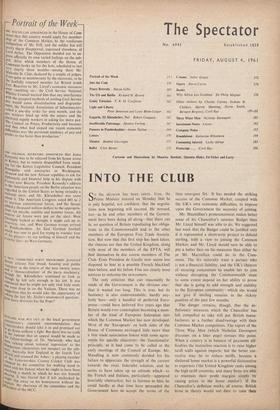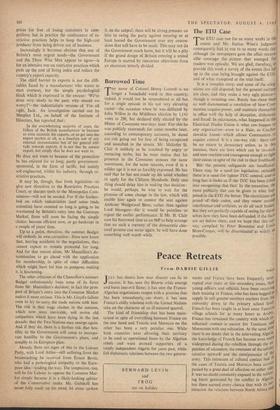INTO THE CLUB
St) the deusion has been taken. True, the Frime Minister insisted on Monday that he is only hopeful, not confident, that the negotia- tions now beginning will succeed. He stressed, too—as he and other members of the Govern- ment have been doing all along—that there can be no question of Britain repudiating her obliga- tions to the Commonwealth and to the other members of the European Free Trade Associa- tion. But now that this first step has been taken, the chances are that the United Kingdom, along with most of the members of the EFTA, will find themselves in due course members of The Club. Even President de Gaulle now seems less disposed to hint at a possible French blackball than before, and his fellow Five are clearly most anxious to welcome the newcomers.
The only criticism that can reasonably be made of the Government is the obvious one: that it waited too long. This is true, but its hesitancy is also understandable; hardly any- body here—only a handful of perfervid Euro- peans—could have believed five years ago that Britain would ever contemplate becoming a mem- ber of the kind of European federation into which the Common Market has now developed. Most of the `Europeans' on both sides of the House of Commons envisaged little more than a free trade association linked with some agree- ments for specific objectives—the `functionalist' principle, as it had come to be called at the early meetings of the Council of Europe. Mr. Maudling is now commonly derided for his failure to appreciate the strength of the current towards the rival, federalist solution, and he seems to have taken up an attitude which—to the French and Italians, particularly—appeared boorishly obstructive; but in fairness to him, he could hardly at that time have persuaded the Government here to accept the terms of the then emergent Six. It has needed the striking success of the Common Market, coupled with the UK's own economic difficulties, to impress upon the Government the necessity of joining.
Mr. Macmillan's pronouncement makes better sense of his Chancellor's summer Budget than Mr. Lloyd himself was able to do. We suggested last week that the Budget could be justified only if it represented a short-term project to defend sterling, with a view to joining the Common Market; and Mr. Lloyd should now be able to put a better face on his measures than either he or Mr. Macmillan could do in the Com- mons. The Six naturally want a partner who is not a financial liability; and the UK's chances of securing concessions to enable her to join without disrupting the Commonwealth must to some extent depend on her ability to prove that she is going to add strength and stability to the European community—which she would not give if sterling remains in the rickety position of the past few months.
The danger remains, though, that the de- flationary measures which the Chancellor has felt compelled to take will put British manu- facturers at a further disadvantage with their Common Market competitors. The report of the Three Wise Men (which Nicholas Davenport discusses on a later page) stresses this point. When a country is in balance of payments dif- ficulties the instinctive reaction is to raise higher tariff walls against imports; but the better cor- rective may be to reduce tariffs, because a sheltered home market is a powerful disincentive to exporters ('the United Kingdom ranks among the high tariff countries, and many firms are able to maintain their profit margins simply by raising prices in the home market'). If the Chancellor's deflation works, of course, British firms in theory would not dare to raise theit prices for fear of losing customers to com- petitors; but in practice the continuance of re- strictive practices helps to keep the high-cost producer from being driven out of business.
Increasingly it becomes obvious that one of Britain's most urgent needs—the Government and the Three Wise Men appear to agree—is for an intensive war on restrictive practices which push up the cost of living index and reduce the country's export capacity.
The chief barrier to exports is not the diffi- culties faced by a manufacturer who wants to start overseas, but the simple psychological block which is expressed in the excuse: 'We've done very nicely in the past, why should we worry?'—the industrialist's version of 'I'm all right, Jack. An investigation carried out by Marplan Ltd., on behalf of the Institute of Directors, has reported that : In the overwhelming majority of cases, the failure of the British manufacturer- to increase or even maintain his exports, or to get into the export market at all, is a function not of any external circumstances but of his general atti- tude towards exports. It is not that he cannot export, but simply that he does not want to. He does not want to because of the protection he has enjoyed for so long; partly government- sponsored, in the form of tariffs; but mainly self-engineered, within his industry, through re- strictive practices.
It may be, though, that fresh legislation—to give new directives to the Restrictive Practices Court, or sharper teeth to the Monopolies Com- mission—will not be needed. For if the feather- bed on which industrialists (and some trade unionists) have snoozed so long is going to be overturned by Britain's entry into the Common Market, firms will soon be facing the simple choice: become efficient now, or go bankrupt in a couple of years' time.
Up to a point, therefore, the summer Budget will embody its own corrective: firms now know that, barring accidents to the negotiations, they cannot expect to remain protected for long, And for that reason alone, Mr Macmillan's de- termination to go ahead with the application for membership, in spite of other difficulties which might have led him to postpone making it, is heartening.
The other criticism of the Chancellor's summer Budget unfortunately loses none of its force from Mr. Macmillan's decision; in fact the pros- pect of Britain's entry into the Common Market makes it more serious. This is Mr. Lloyd's failure even to try to carry the trade unions with him. The risk is that wage clashes in the autumn, which now seem inevitable, will revive old antipathies which have been dying in the last decade: that the Two Nations may emerge again. And if they do, there is a further risk that hos- tility to the Government will come to incorpo- rate hostility to the Government's plans, and notably to its European plan.
Already there are signs of this in the Labour Party, with Lord Attlee—still suffering from the brainwashing he received from Ernest Bevin, who had a pathological antipathy to the Euro- pean idea—leading the way. The temptation, too, will be for Labour to oppose the Common Mar- ket simply because it is a likely-looking splitter of the Conservative ranks. Mr. Gaitskell has never fully made up his mind, let alone spoken it, on the subjeci; there will be strong pressure on him to swing the party against entering or at least hound the Government over any conces- sions that will have to be made. This may not do the Government much harm, but it will be a pity if the grand design of Britain entering a united Europe is marred by rancorous objections from an electorate bitterly divided.



































 Previous page
Previous page